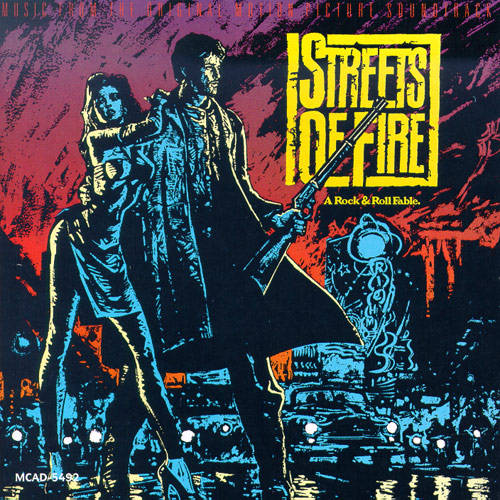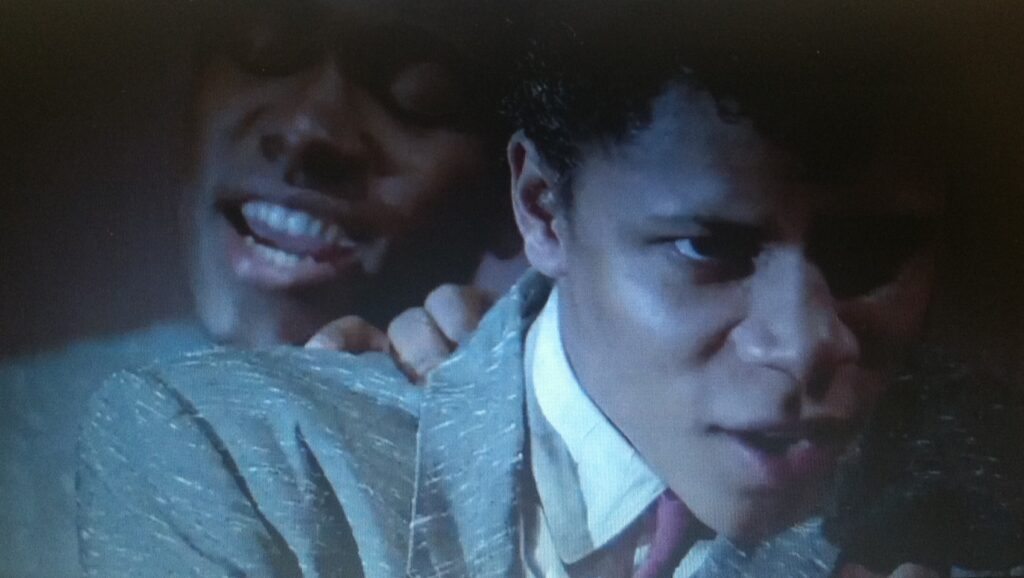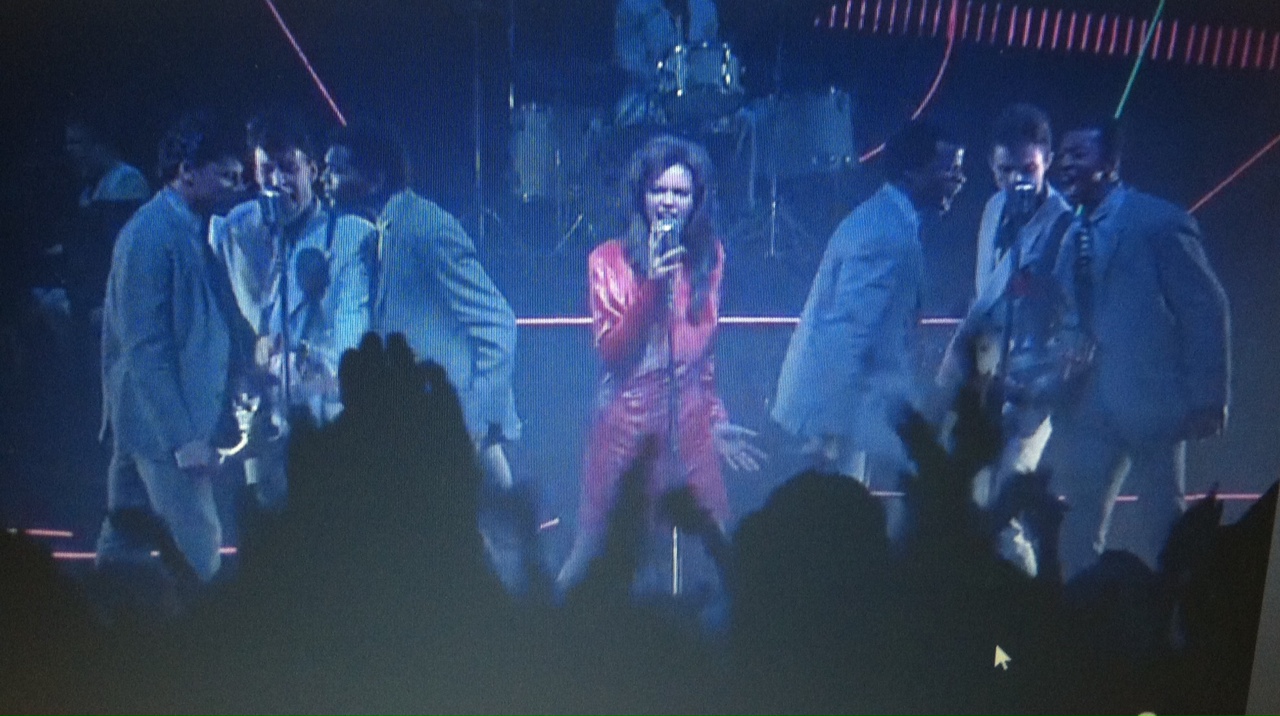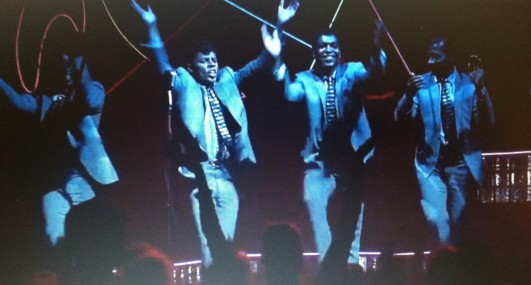
Actor Mykelti Williamson Remembers When The “I Can Dream About You” Music Video From STREETS OF FIRE Made Him Famous (Sorry, Dan Hartman)
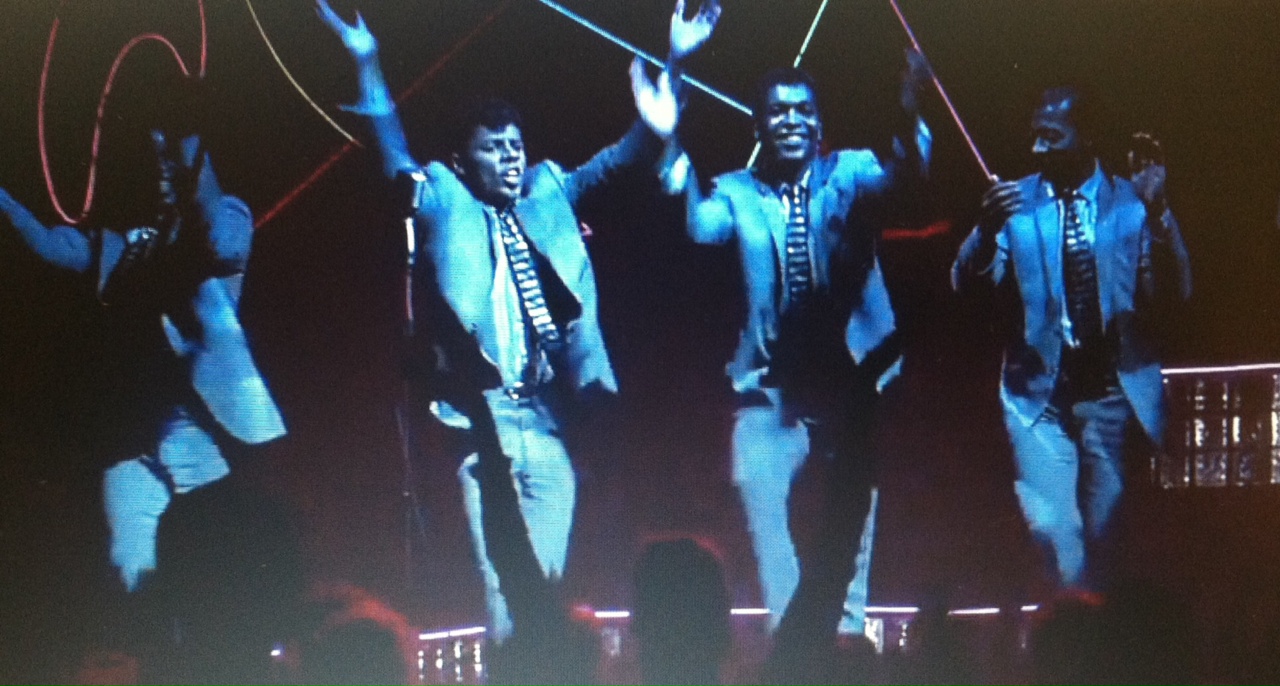
The Sorels! Grand L. Bush, Stoney Jackson, Mykelti Williamson, and Robert Townshend in the music video for Dan Hartman’s “I Can Dream About You”
In 1984, Dan Hartman’s “I Can Dream About You” from the film STREETS OF FIRE sprinted up the Billboard Pop Chart on the strength of a heavily-rotated music video. The phenomenon of this catchy love song’s popularity logs in as one of the strangest occurrences in THE GOLDEN AGE OF MUSIC VIDEO. See if you can follow…
Dan Hartman wrote and recorded a version of the song for the movie, a song that Daryl Hall claims Hartman offered Hall & Oates but was turned down. The film actually features a version of “I Can Dream About You” sung by C. Winston Ford, but Hartman’s rendition ended up on the film soundtrack. The music video featured the soundtrack version of the song and footage from the film, and Hartman did not appear in either. The video featured the Sorels, a fictional singing group created for the film, singing the song and dancing in a big performance scene. Now, to make things more complicated, the group lip-syncs the song, with Stoney Jackson singing the Dan Hartman part, but the actors portraying the Sorels did sing backup on Dan Hartman’s recorded version. After the video moved into heavy rotation, the Sorels’ “lead singer” was often mistaken for Hartman because of the music video’s onscreen credit of Dan Hartman as the artist. In the end, STREETS OF FIRE bombed at the box office, but the song landed at #6 on the Billboard Hot 100, giving the unseen Dan Hartman the biggest hit of his solo career. Got all that?
In on the fun and confusion was actor Mykelti Williamson, who played one of the Sorels along with Stoney Jackson, Robert Townshend, and Grand L. Bush, but went on to recognition in many roles, the most famous being Forrest Gump’s friend Bubba. Williamson is currently receiving accolades for his portrayal of Ellstin Limehouse in the FX series “Justified” (New York Magazine called him 2012’s Scene Stealer of the Year). Mykelti took time to speak to THE GOLDEN AGE OF MUSIC VIDEO about “I Can Dream About You”, his fellow Sorels, and the whole “I Can Dream About You” experience.
***********************************************************************************************
Going back to the beginning of your career, were you one of the guys in the original Lockers [breakdance crew]?
I was actually an alternate in the Lockers. The original Lockers, Don Campbell, Fred Berry, Leo Williamson, “Shabba-Doo” Quinones, all those guys, they’d do the big shows, and so they wouldn’t miss the money, they’d have alternates do the shows that didn’t pay as much. They didn’t want the reputation of people wanting the Lockers and not being able to book them, so we’d show up, with the big pizza hats and knickerbockers and suspenders and funny makeup we’d have on. People didn’t know if we were the real Lockers or not!
Were you on Soul Train?
M: I was on Soul Train a lot. I was not an official member of the gang, but I was on there. I was acting, but I was frequently on there. I started my own group called the Kids, and we toured with Bob Hope’s USO show, and one thing led to the next, appearing on Don Kirshner’s Rock Concert, things like that. Things just started working out. I ended up with an audition for “Starsky & Hutch”. And it was funny because I was also a part of this group called the Dance Masters, some guys out of Compton. One day my agent called and said all the guys in my group who went in for the “Starsky & Hutch” audition were terrible, and could I act? I said yes, went in and got a guest star appearance. I never looked back after that.
Let’s talk about this interesting music video moment in your career. Can you tell me a little about how STREETS OF FIRE came to you? Was it just another typical audition?
M: It was. Actually, two of my agents, Martin Lesack and Nina Pakula, told me about the audition, and I thought, that sounds cool. So I went in and met [STREETS OF FIRE director] Walter Hill. I just whipped out my harmonica and started playing, and he laughed and told me, “That’s the corniest audition I’ve ever seen, but it was great.” I landed the job. I’d met Robert Townshend before, but I met Grand Bush for the first time, and a dear friend of mine, Stoney Jackson. And I met Diane Lane, who was just a baby at the time. She was more of a baby than we were! And Michael Pare, who I haven’t seen in a very long time.
Those scenes onstage are really amazing, and Walter Hill is an amazing filmmaker, but I don’t believe he’s shot a lot of dance sequences in his career. Who was the choreographer?
M: I’m trying to remember, I believe his name was Jeff, and he was wonderful. We actually started out working with him on the choreography, and he was such an open-minded choreographer, we decided to meet at Robert Townshend’s apartment and choreograph our own steps. He was so supportive. There was no ego involved. He just kind of let us do our own thing. It was really wonderful, a great experience. I also remember that Robert Townshend was the weakest dancer out of all of us. (laughs) Rob couldn’t stay on beat! We would dog him out — a black dude with no beat! We even found a way for Rob, with his off beat dance steps, to get it done. If you look at the video, you’ll see it, but Rob had so much charm and character, it worked. But he could not stay on beat to save his life.
As we both know, STREETS OF FIRE, shall we say, underperformed, but this video was huge. In the film, the Sorels are basically a group, but then the video starts getting played, and the film faded away as the song climbed. The next thing you know, you guys are all over MTV and people associate the Sorels with the song rather than Dan Hartman. Do you remember how you felt when that was happening?
M: I remember it vividly. I remember there was a gentleman by the name of Jimmy Gilstrap who actually arranged the song, even though Dan Hartman had written it. Jimmy was our vocal coach for the actors on the song. I remember that well.
So you were in a group that didn’t sing the song in a movie nobody saw, but then you were famous for appearing in a hit video and all the group members went on to success in film but not music. It’s one of the strangest phenomena to ever occur in pop music.
M: (Laughs) Well, to be clear, we actually sang background in the track, with the lead sung by Dan Hartman. That was part of the plan by Walter Hill and [producer] Joel Silver. At the time, Joel was just cutting his teeth as a producer. He let Walter have control over the film, which we were grateful for, but Joel knew back then that you needed to give the director the freedom to make the film. He had great instincts and just stood back. It was great. We were in Chicago and Los Angeles shooting the performance scenes.
Did you start getting recognized after the video began airing?
M: Yes, right away. People thought Stoney Jackson was Dan Hartman and the rest of us were the Sorels. We had actually secured a record deal. My manager at the time was a gentleman named Phillip Miles. His motto was “It’s A Jungle Out There” and he always wore a pith helmet like he was on safari. Phillip secured two record deals for us, got a little bidding war going. Then one of the guys decided he was going to try to get his own record deal. We were about to ink our record deal, but when the record company heard that there was already dissension and members trying to get their own separate deals, they dropped us like a hot rock. And the member who did that was Stoney Jackson. Stoney’s ego was so out of control. And he’s a dear friend, he’s like a little brother to me. But his ego was so massive that he cost us all a record deal.
Backstory on Dan Hartman — when the video made us all really popular and people were stopping us on the streets, they’d see us in a shopping area street corner and they’d put the song on their radio and point at us and say, “I got your song!” It was amazing. Dan Hartman was so upset, he wanted people to know it was him singing, not Stoney.
A second video for that song was created with Hartman as a bartender and featured the film scenes playing on a TV in the bar, but by then the song was already strongly associated with the Sorels-version video. Then, strangely enough, the Sorels appeared in the video for Hartman’s follow-up single “We Are The Young”. How and why did that happen?
Dan approached our agents to get us to do a music video with him. At the time, you would only get a couple of hundred bucks to appear in a music video, but you could use it to elevate whatever you needed to elevate. Dan was so upset that he insisted that they do another music video right away so people would know who Dan Hartman really was. When I caught wind of this, I told my manager that these guys were going to pay us peanuts and that they needed to offer us $5000 a piece, because he’s getting ready to mess us up, you know? I said, if he really wants people to know who he is, he’s gotta pay for it. So we waited, and they coughed up $5000 a piece for us to appear, and in those days, that was big loot. So in the video, we came out behind him singing and doing choreography.
That was for “We Are The Young”, right?
M: Yes, so people would know he was Dan Hartman. But after that, his record sales died. I guess, you know, Stoney’s a really good looking guy. A lady killer. I guess when people found out that wasn’t Dan Hartman, they were like, “Shhh, please.” I don’t know what happened to his career after that. [For the record, “We Are The Young” broke into the Billboard Top Forty, but Hartman never charted that high again.]
What’s become of Stoney Jackson? He’s a tough guy to track down.
M: He moved from L.A. to Florida. He still does some acting, if he likes the part, but he’s primarily in real estate sales. That’s actually how I found my house. Stoney was my real estate agent.
That’s amazing. All the actors who played the Sorels went on to successful film careers. Robert Townshend became a filmmaker, Grand Bush went on to great parts in DIE HARD, HOLLYWOOD SHUFFLE and more, and Stoney Jackson was a lead in the ABC series “The Insiders”. You went on to this massive career, everything from playing Bubba in Forrest Gump right up to your current role on FX’s “Justified”. How’s that going, by the way?
M: It’s going very well, I’m on “Justified”, but I’m also the writer director on a series called “Wigs” on youtube.com/wigs. Google YouTube has its own network, and John Avnet and Rodrigo Garcia asked me to join the creative team for that. All the episodes are five to seven minutes long and all feature strong female leads. I’m actually in the middle of writing two episodes right now.
Do you sometimes see [STREETS OF FIRE actress] Diane Lane on the red carpet and say “Hey, remember when we did that?”
M: Yes! We point at each other. We often see each other in a press line when we are walking into a place, and we’re busy chatting it up on camera, so you point. I’ve hugged her neck a few times too.
“I Can Dream About You” and STREETS OF FIRE sounds like something you look back on fondly.
M: I do look back on the experience very fondly, the lifelong friendships I made, from Walter Hill to Robert Townshend to Michael Pare to Amy Madigan to Rick Rossovich to Bill Paxton to Diane Lane. I mean, we’re all still friends to this day.
**********************************************************************************************
Check out this video as Daryl Hall tells the story of how Dan Hartman wanted Hall & Oates to record “I Can Dream About You”.


